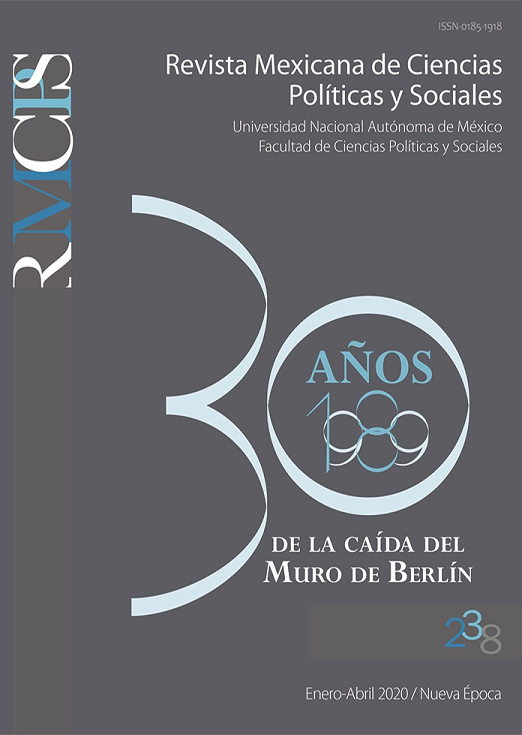The Fall of the Wall: From the Hope of a More Democratic World to the Reality of Friend-Enemy Politics
Main Article Content
Abstract
Downloads
Article Details
Citas en Dimensions Service
References
Arendt, Hannah (1969) The Origins of Totalitarianism. Cleveland/Nueva York: Meridian Books.
Canovan, Margaret (1981) Populism. Nueva York: Harcourt Brace Jovanovich.
Coppedge, Michael (2002) Venezuela: Popular Sovereignty versus Liberal Democracy [en línea]. Working Paper, 294. University of Notre Dame. Disponible en: https://www.researchgate.net/profile/Michael_Coppedge/publication/265496175_Venezuela_Popular_Sovereignty_versus_Liberal_Democracy/links/5512da410cf20bfdad522f02.pdf [Consultado en octubre de 2019].
De la Torre, Carlos (2013) “In the Name of the People: Democratization, Popular Organizations, and Populism in Venezuela, Bolivia, and Ecuador” European Review of Latin American and Caribbean Studies/Revista Europea de Estudios Latinoamericanos y del Caribe (95): 27-48.
Dornbusch, Rudiger y Sebastian Edwards (1991) “The Macroeconomics of Populism” en Dornbusch, Rudiger y Sebastian Edwards (eds.) The Macroeconomics of Populism in Latin America. Chicago: University of Chicago Press.
Germani, Gino; di Tella, Torcuato y Octavio Ianni (1973) Populismo y contradicciones de clase en Latinoamérica. Ciudad de México: Ediciones Era.
Hermet, Guy (2001) Les populismes dans le monde. Une histoire sociologique xixe-xxe siècle. París: Fayard.
Horkheimer, Max y Theodor W. Adorno (2006) Dialéctica de la Ilustración. Fragmentos filosóficos. Madrid: Taurus.
Kaufman, Robert y Barbara Stallings (1991) “The Political Economy of Latin American Populism” en Dornbusch, Rudiger y Sebastian Edwards (eds.) The Macroeconomics of Populism in Latin America. Chicago: University of Chicago Press.
Laclau, Ernesto (2005) La razón Populista. Ciudad de México: Fondo de Cultura Economica.
Lefort, Claude (1981) L’invention démocratique. Les limites de la domination totalitaire, París: Fayard.
O’donnell, Guillermo (1998) “Horizontal Accountability in New Democracies” Journal of Democracy, 9(3).
Polanyi, Karl (1983) La Grande Transformation. Aux origines politiques et économiques de notre temps. París: Editions Gallimard.
Robinson, James A. (2005) A Normal Latin American Country? A Perspective on Colombian Development (unpublished manuscript) [en línea]. Harvard University, Department of Government, CEPR, CIAR and NBER. Disponible en: https://scholar.harvard.edu/files/jrobinson/files/jr_normalcountry.pdf [Consultado en octubre de 2019].
Schmitt, Carl (1992) La Notion du Politique: Théorie du Partisan. París: Champs Flammarion.
Schmitter, Philippe (2019) “The Vices and Virtues of ‘Populisms’” Sociologica. International Journal for Sociological Debate, 13(1).
Targuieff, Pierre-André (2003) L’Illusion populiste. París: Champs Flammarion.
Touraine, Alain (1988) La Parole et le sang. París: Odile Jacob.

La Revista Mexicana de Ciencias Políticas y Sociales publicada por la Universidad Nacional Autónoma de México se distribuye bajo una Licencia Creative Commons Atribución-NoComercial-SinDerivar 4.0 Internacional.
Basada en una obra en http://www.revistas.unam.mx/index.php/rmcpys/
La RMCPyS autoriza a sus colaboradores que suban una copia de sus trabajos publicados en sus webs personales o en cualquier repositorio de acceso abierto, siempre y cuando se mencione específicamente a la Revista Mexicana de Ciencias Políticas y Sociales como fuente original de procedencia, citando el año y número del ejemplar respectivo y añadiendo el enlace a la página web donde este órgano editorial puede ser consultado in toto, de manera abierta y gratuita en: <www.revistas.unam.mx/index.php/rmcpys>.
Las y los lectores tienen libertad para:
Compartir, copiar y redistribuir el material en cualquier medio o formato.
El licenciante no puede revocar estas libertades en tanto usted siga los términos de la licencia.
De acuerdo con los siguientes términos:
- Atribución: la/el lector/a debe reconocer el crédito de una obra de manera adecuada, proporcionar un enlace a la licencia, e indicar si se han realizado cambios. Puede hacerlo en cualquier forma razonable, pero no de forma tal que sugiera que tiene el apoyo del licenciante o lo recibe por el uso que hace.
- No comercial: la/el lector/a no puede hacer uso del material con fines comerciales.
- Si se mezcla, transforma o se desarrolla a partir de la obra licenciada, no se permite la distribución del material modificado.
Cargos por gestión de artículos
La Revista Mexicana de Ciencias Políticas y Sociales NO cobra tarifas por recibir, procesar o publicar los artículos (Article Processing Charge [APC]) enviados por los autores.

